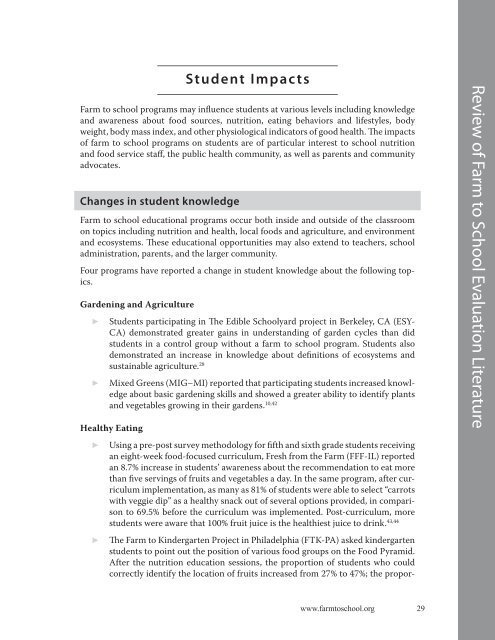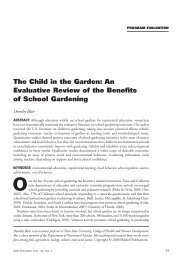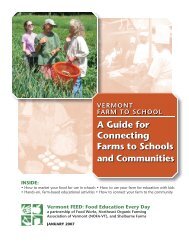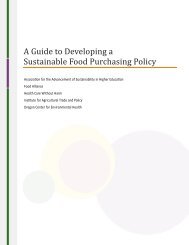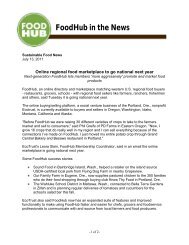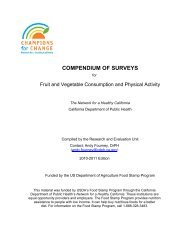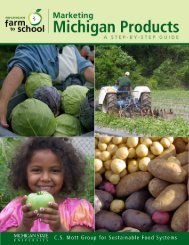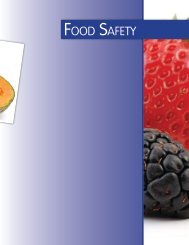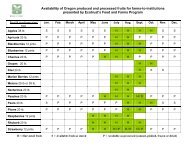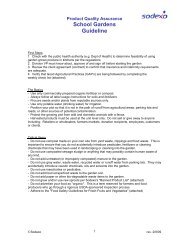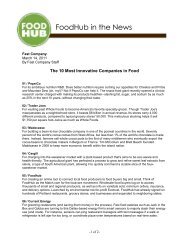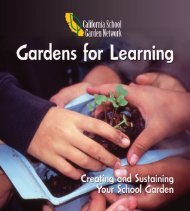eval report cover.indd - New Jersey Farm to School Network Wiki
eval report cover.indd - New Jersey Farm to School Network Wiki
eval report cover.indd - New Jersey Farm to School Network Wiki
Create successful ePaper yourself
Turn your PDF publications into a flip-book with our unique Google optimized e-Paper software.
Student Impacts<strong>Farm</strong> <strong>to</strong> school programs may influence students at various levels including knowledgeand awareness about food sources, nutrition, eating behaviors and lifestyles, bodyweight, body mass index, and other physiological indica<strong>to</strong>rs of good health. The impactsof farm <strong>to</strong> school programs on students are of particular interest <strong>to</strong> school nutritionand food service staff, the public health community, as well as parents and communityadvocates.Changes in student knowledge<strong>Farm</strong> <strong>to</strong> school educational programs occur both inside and outside of the classroomon <strong>to</strong>pics including nutrition and health, local foods and agriculture, and environmentand ecosystems. Th ese educational opportunities may also extend <strong>to</strong> teachers, schooladministration, parents, and the larger community.Four programs have <strong>report</strong>ed a change in student knowledge about the following <strong>to</strong>pics.Gardening and Agriculture►►Students participating in The Edible <strong>School</strong>yard project in Berkeley, CA (ESY-CA) demonstrated greater gains in understanding of garden cycles than didstudents in a control group without a farm <strong>to</strong> school program. Students alsodemonstrated an increase in knowledge about definitions of ecosystems andsustainable agriculture. 28Mixed Greens (MIG–MI) <strong>report</strong>ed that participating students increased knowledgeabout basic gardening skills and showed a greater ability <strong>to</strong> identify plantsand vegetables growing in their gardens. 10,42Healthy Eating►►Using a pre-post survey methodology for fifth and sixth grade students receivingan eight-week food-focused curriculum, Fresh from the <strong>Farm</strong> (FFF-IL) <strong>report</strong>edan 8.7% increase in students’ awareness about the recommendation <strong>to</strong> eat morethan five servings of fruits and vegetables a day. In the same program, after curriculumimplementation, as many as 81% of students were able <strong>to</strong> select “carrotswith veggie dip” as a healthy snack out of several options provided, in comparison<strong>to</strong> 69.5% before the curriculum was implemented. Post-curriculum, morestudents were aware that 100% fruit juice is the healthiest juice <strong>to</strong> drink. 43,44Th e <strong>Farm</strong> <strong>to</strong> Kindergarten Project in Philadelphia (FTK-PA) asked kindergartenstudents <strong>to</strong> point out the position of various food groups on the Food Pyramid.After the nutrition education sessions, the proportion of students who couldcorrectly identify the location of fruits increased from 27% <strong>to</strong> 47%; the propor-Review of <strong>Farm</strong> <strong>to</strong> <strong>School</strong> Evaluation Literaturewww.farm<strong>to</strong>school.org 29


